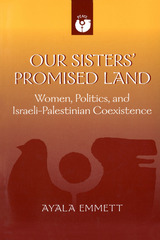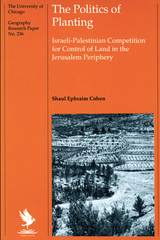


Emmett investigates the successes and failures of women in the Israeli political landscape, particularly the harassment experienced during the leadership of Right and ultra-Right groups before the ascension to office of the late Prime Minister Yitzhak Rabin. Her account of women's activism in Israel provides a rich backdrop for viewing the compelling events that have taken place in the Middle East throughout the 1990s and offer insights into the future of women's political activism, both in the ever-changing Israeli political climate and in the broader world of women in politics.
"Brilliant in conception and theory, based on superb fieldwork, and clearly written for both specialist and non-specialist reader." --Maurie Sacks, Montclair State University
"A groundbreaking study. . . .Ayala Emmett brings an unusual voice of clarity into the muddled politics of the Middle East. Where most studies ignore or marginalize women's role in the peace process, Emmett highlights women as political actors and shows their capacity to bridge the chasm between two hostile peoples." --Cynthia Saltzman, Rutgers University, Camden
Ayala Emmett is Associate Professor of Anthropology, University of Rochester.

The future of the West Bank and Gaza remains the single most crucial issue in the search for peace in the Middle East. Examining the entire range of possible outcomes, Mark Heller argues that an independent Palestinian state in those territories, even one dominated by the PLO, could, under certain stringent conditions, be the preferred option for Israel.
In the first comprehensive treatment of the political, social, economic, and military factors bearing on the disposition of the West Bank and Gaza, Heller sets forth the possible alternatives—annexation by Israel, perpetuation of the status quo, federal or communal arrangements, and territorial compromise within the framework of the Jordanian option—and evaluates their implications for Israeli security.
Heller outlines the conditions under which he believes the establishment of a Palestinian state could be the optimal solution. He also discusses the economic prospects of a Palestinian state and the future of Jerusalem. His analysis is the boldest attempt yet to come to grips with the Palestinian question and the future of Israel. No one interested in the pursuit of a peaceful settlement of the Israeli–Arab conflict can afford to ignore this book.

Shaul Ephraim Cohen has conducted an unprecedented study of planting in the region and the control of land it signifies. In The Politics of Planting, he provides historical background and examines both the politics behind Israel's afforestation policy its consequences. Focusing on the open land surrounding Jerusalem and four Palestinian villages outside the city, this study offers a new perspective on the conflict over land use in a region where planting has become a political tool.
For the valuable data it presents—collected from field work, previously unpublished documents, and interviews—and the insight it provides into this political struggle, this will be an important book for anyone studying the Israeli-Palestinian conflict.
READERS
Browse our collection.
PUBLISHERS
See BiblioVault's publisher services.
STUDENT SERVICES
Files for college accessibility offices.
UChicago Accessibility Resources
home | accessibility | search | about | contact us
BiblioVault ® 2001 - 2024
The University of Chicago Press









